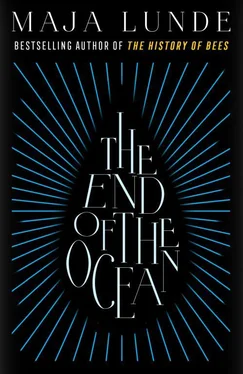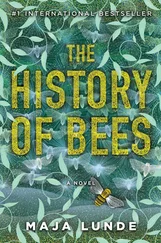“That’s not true. You can’t walk on water.”
“Yes, you can. It’s called groundwater.”
“And we walk on it?”
“In some places there’s a lot. In South America, for example, on the other side of the Atlantic Ocean, the Guarani reservoir is located underground.”
“We walk on it. Like Jesus.”
“We walk on the ground, but the water is beneath us, between layers of soil and stone, so it’s not exactly like Jesus.”
“But almost.”
“There’s groundwater everywhere. It’s under us now, too.”
“Now?”
“Yes.”
“Here?”
“Yes.”
“But why can’t we just dig for it?”
“It’s too deep. And the water is mixed with soil and stones.”
“Can’t we try?”
“People did try a long time ago.”
“But what about that place in America, then?”
“South America. There you can dig for it. And it’s enormous. It extends all the way under Brazil, Argentina, Paraguay and Uruguay.”
“Paraguay, Uruguay?”
“It’s much bigger than all of France… there’s enough water for the whole world to survive on.”
“Wow.”
“For two hundred years.”
“Wow!”
“Yes. Wow.”
“Who owns it?”
“I don’t know… I guess it’s the people who own the land on top of it.”
“But somebody owns it?”
“I believe so.”
“How can somebody own water?”
*
We had arrived. She let go of my hand and trotted away, ducking in beneath the shadow of the trees. Yippee her shoulders said. And her braids bounced against her T-shirt.
We walked through the garden, passing the rainwater tank. I would have liked to try to open it, maybe there was a key in the house. But Lou had disappeared in the direction of the boat and I followed behind her.
“We’re just going to put the tarps back on,” I said. “And tie the ropes tightly. Remember that. The boat isn’t ours.”
But she didn’t answer. And when we were sitting in the cockpit again, it quickly became clear that we hadn’t come to cover up the boat again right away.
Because it was cool in the shade between the trees. There was even a bit of a breeze up there. And almost immediately, Lou was back in the game. She shouted, she screamed and yelled, shot and fenced, laughed and cried. She raised the sail, fought against pirates and found a baby dolphin that was her own. It swam after the boat and was named Nelly. I had no idea where she got that name from.
I was an extra. The stupid sailor. I did as she said, took part in her game of make-believe. And then you, like, said this, and then I answered that, and then you, like, suddenly jumped to one side, and then it was night and you got, like, scared. And then we sailed to the end of the ocean.
There was never any fire in her games. Even if we were in danger, it was never really scary. And there was water everywhere, all the time.
I followed orders. I breathed easily.
But finally it was Lou who didn’t want to play anymore.
“I’m thirsty.”
We’d brought along a half-liter bottle of water that we’d filled up that morning when the rations were doled out, but it was long since empty. I could feel the dust from the dry soil on my tongue.
“We have to go back,” I said.
“No,” Lou said.
She was filthy. A thin layer of dust covered her skin. There were grimy streaks of sweat on her face. One of her braids had slipped out of the rubber band and her hair was tangled. We needed water for more than drinking.
“We’ll have to fill out the forms again and stand in line, from the looks of you,” I said.
“Do we have to stand in line? Won’t they let us in again?”
“I’m kidding, Lou.”
“Won’t they let us into the camp?”
“Yes, they will, don’t worry.”
But suddenly she was tense, her little body on alert. I regretted making the joke.
“Fine,” I said. “We can stay here a little longer if we find water.”
“Where?”
I nodded towards the rainwater tank in the garden.
“There.”
*
I tried all the keys from the house. One by one.
“None of them fit,” I said.
“Why not?” Lou asked.
“So we have to go home,” I said.
“But can’t we open it some other way?”
I nodded slowly, realizing how thirsty I was. I thought about the water down there. Clear, dark, cold water.
*
I struck the padlock again and again. First with a stone, then with a rusty spade I found in the outbuilding.
But the lock was far too solid. They only made things this solid back in the old days.
While I was banging away at the padlock, I tried smiling at Lou—see, it will be fine, the smile was supposed to say, see, I’ll fix everything. But I didn’t fix anything. I just got more and more sweaty.
Finally I put the spade on the ground and sank down on the lid of the tank.
Lou looked at me with dissatisfaction. Then she reached into her hair with one hand, took something out and handed it to me. A bobby pin.
“That’s what thieves do.”
Jesus. “Where did you learn that?”
She shrugged. “I don’t know.”
“Did you see it in a movie?”
“Maybe. I can’t remember.”
I puttered with the hairpin for a while, jiggling and coaxing the lock. Finally it opened. I raised the lid. We stuck our heads over the edge and peered down into the darkness.
“Yoo-hoo,” Lou called.
Her voice echoed.
An old iron bucket was hanging on the inside of the tank. I threw it down. Hollow sounds reverberated against the walls.
Then we heard the sound of a splash far below.
“Water!” Lou said.
The sound of water, it was really water.
I felt the bucket take hold. Tip over. And grow heavier as it filled up.
I pulled it up again and Lou leaned forward in excitement.
Then I lifted it over the edge. We looked inside, both of us.
It was only a quarter full and the contents could not exactly be called water. The sour-smelling liquid was a light-brown color and there were flakes of rust swirling through it.
Lou wrinkled her nose.
“Can we drink it?”
I shook my head, realizing how disappointed I was.
“But I’m so thirsty,” Lou said.
“I know that.”
“Very thirsty.”
“We can’t drink it.”
She bowed her head, mumbling from between her shoulders. “Mommy always had water.”
“What did you say?”
Then she looked at me.
“Mommy always had water.”
“She certainly did not.”
“She certainly did.”
“But it was from the faucet.”
I was about to say more, but stopped myself in time. Because Anna had always had water. She always remembered to bring along an extra bottle. For the children. For us. But now we were sitting here, without Anna, without water, only Lou and I.
The world was empty—no people, no animals, no insects, no plants. Soon even the largest trees would die, in spite of their deep roots. Nothing could survive this.
We sat there, alone, and all we had was a quarter of a bucket of undrinkable sludge.
“Daddy?”
I turned away, didn’t want her to see how shiny my eyes were. I got to my feet, took a couple of deep breaths. Pull yourself together, David.
“We can’t drink it,” I said. “But we can at least clean you up a little bit.”
*
I found an old rag in the outbuilding. I dipped it in the rusty water and wrung it out. The water was cool against my skin. It felt like water. That was at least something.
“Close your eyes,” I said to Lou.
Then I wiped her cheeks and forehead. She stood facing me, completely still and just relishing the feeling of the cold, damp rag against her skin.
Читать дальше










